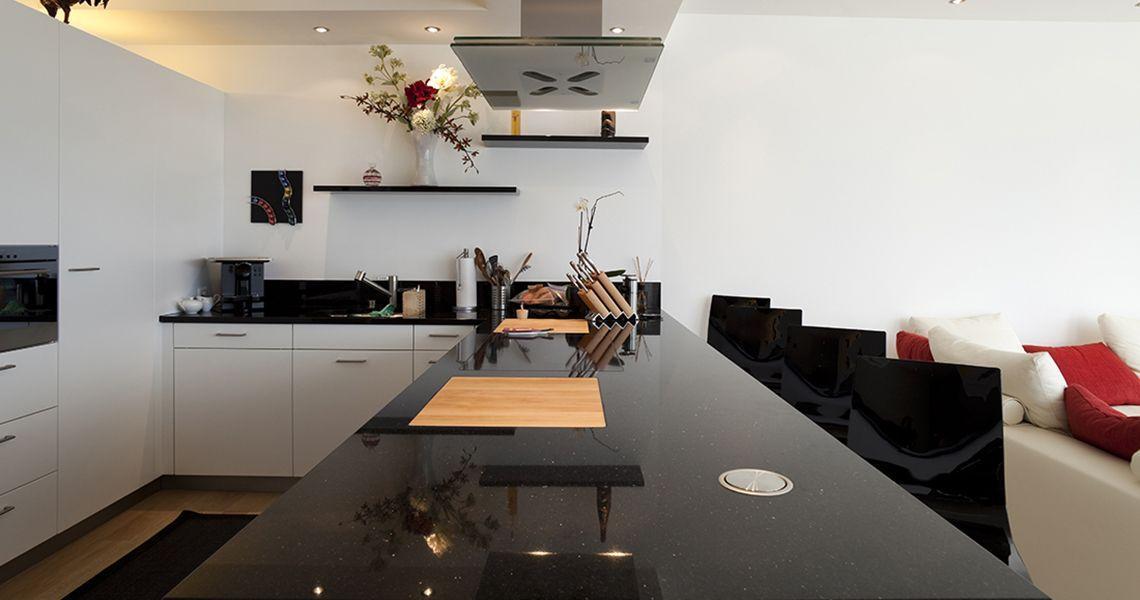
Quartz Countertops as an Alternative to Granite
Over the past 50 years, engineered quartz has made a name for itself and gained a reputation as a high-end countertop material for kitchens and bathrooms. However, it has taken decades for people to see the benefits of quartz countertops, and even today, quartz has its rivals and competitors, including granite. Even if you are not familiar with the name “engineered quartz,” you may be familiar with the brand names Cambria, Caesarstone or Silestone for kitchen and bathroom design. Though these are all different brands, they are extremely similar, and even use the same patent for the countertops they produce. The main difference comes from where the quartz is quarried from and how the slurry is mixed. Confused? Most people are. Read on to find out more about a quartz countertop as an alternative to granite.
How Are Quartz Countertops Made?
Quarry? Slurry? These are two words that confuse many consumers when it comes to a quartz countertop. Contrary to popular belief, a quartz countertop is not a slab of natural stone, like granite or marble may be. Instead, quartz countertops are engineered. The basic process to make engineered quartz is to use quartz stone and other materials, such as marble and even granite, and mix it with resins and dyes making a slurry. When completed, the man-made slab is made up of about 90 percent stone and 10 percent binders and dyes.
This mixture gives quartz countertops a hardness that rivals granite, but it also has features that granite does not have. For instance, since granite is a natural stone it has small pores within its surface. These pores may absorb liquids over time if not properly cared for. Quartz, however, does not have these pores, so it will not absorb anything. In addition, since quartz is made by man, materials can be added to the slurry, such as antibacterial substances.
The Italian Connection
Quartz countertops have only been around for a few decades, and it all goes back to Italy. Back in the late 1960s and early 1970s, the Italian company Brevetti Toncelli, which is today known as Breton, developed a way to mix stone with polymers to create a solid material with exceptional strength and durability. Breton still owns the patent for engineered quartz, and modern companies including Cosentino, Cambria and DuPont all use the same patent to create their products. What does this mean for you? It means wherever you buy engineered quartz, regardless of the brand, it will be almost identical to any other slab of engineered quartz.
The Look and Feel of Quartz
The main difference between the countertop materials comes in the looks. For instance, if you want a solid color, such as black, which looks stunning with white or brown cabinetry, you can find that with quartz. You cannot find it with granite as there will always be some type of veining or varying coloration running through. However, you can also find quartz with glass or stone incorporated into it, which makes it look remarkably like natural granite.
The Benefits and Features of Quartz
There are a number of benefits and features of quartz. For instance, homeowners love the look of the material. In fact, this is the chief reason that people buy quartz. Another benefit of quartz is the hardness. This material is exceptionally hard, and it makes an excellent work surface in the kitchen. The only thing you have to watch out for is heat, as hot pots and pans, for instance, may scorch the surface.
You will also find that there are very few, if any, imperfections with quartz. Due to this, an installer often has an easier time when installing quartz since the look is the same throughout. This is not the same with granite.
The Cost of Quartz Countertops
Some people believe that quartz is more affordable than granite, but this is not the case. You will find very expensive options in both cases, odds are, if you are looking at quartz and granite with a similar look and features, they will be close to the same cost.
This is just a bit of the available information on quartz countertops for bathroom and kitchen design. For more information, talk to a professional quartz installer.